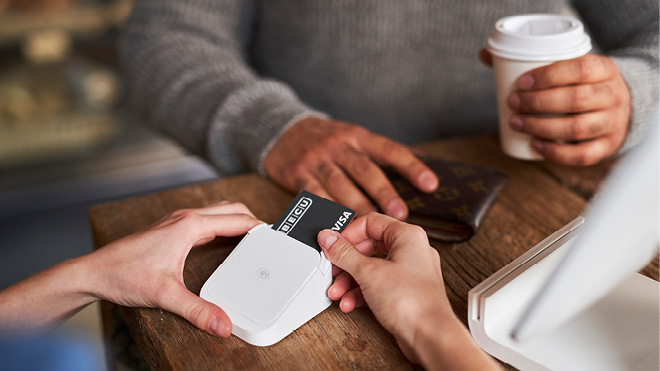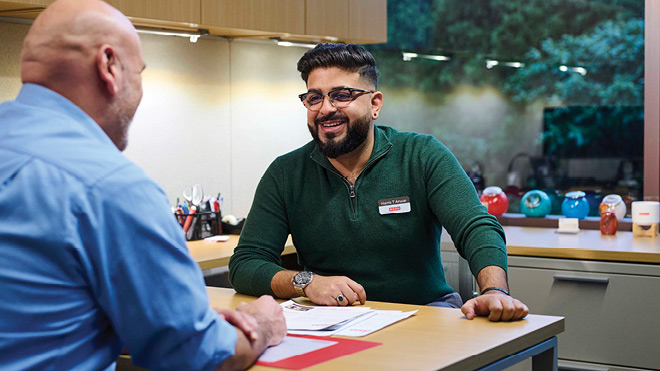
What Is a Checking Account?
Checking accounts are one of the safest, least expensive ways to spend and receive money. Learn about how they work, some of their common features and different types of accounts.
Checking accounts hold your cash as "liquid assets," a financial term that means you don't have to wait to access your money. It's immediately available.
Different financial institutions offer accounts with different features, fees and ways to spend, withdraw, deposit, save and earn money. We'll walk through the basics to help you decide what you need and choose the account that works best for you.
Takeaways: What You Need To Know About Checking Accounts
- Checking accounts are commonly used for paying bills, making purchases, depositing and withdrawing money.
- You can access money in your checking account using a variety of methods, including debit card purchases, online payments, paper checks, ATM withdrawals and more.
- You can also deposit money into your checking using a variety of methods, including in person at a branch, with an ATM machine, direct deposit, mobile app and more.
- Different financial institutions may charge fees such as maintenance, overdraft or wire transfer fees.
- Checking accounts are insured by FDIC or NCUA at insured financial institutions.
How Do Checking Accounts Work?
A checking account can be used to deposit money, pay bills, make purchases when you shop at stores, pay for services, receive payments or send money. You can pay for purchases from your checking account in the U.S. or while traveling abroad, and you can access account services in person or online.
Your checking account will have a unique number you can use to set up direct paycheck deposits or pay bills automatically. Your checking account number differs from your savings account number, but checking accounts are often linked to a savings account. (BECU members are required to have a savings account to open a checking account.)
Checking accounts typically feature much lower fees than check-cashing services or other forms of payment. The money you put in a bank or credit union checking account is also protected: Up to $250,000 of your money — per person, per financial institution — is insured by the NCUA at a credit union or FDIC at a bank.
Common Checking Account Features
Deposit Features
The most important advantage of a checking account is that it allows you to safely deposit and store money, cash paper checks and receive paychecks via direct deposit. You can skip the ATM or teller line and use your phone to take a photo of a check and deposit it using your financial institution's mobile app.
When money is sent to your account, there may be a temporary hold on those funds until the credit union or bank can ensure that the check or payment is valid.
A combination of direct deposit or paper check deposit with a checking account offers more consumer protection and fewer fees than prepaid cards. In addition, you can quickly move money between checking and savings accounts.
Payment Features
A checking account is versatile and flexible. You can pay others with your checking account using various tools, including:
- Paper checks: Your financial institution may give you checks with your name and contact information pre-printed on the check. You can pay others with a check you offer in person or by mail.
- Automatic payments: You can schedule automatic payments to be deducted from your account. This can ensure payments for bills such as utility, credit card and rent payments arrive on time.
- Money order: This is a paper check you can buy to automatically deduct funds from your checking account. It does not have your name or contact information pre-printed on it.
- Cash: You can withdraw paper money from your checking account to make purchases or use cash to help with a budget strategy, such as envelope budgeting.
- Third-party payment apps: Institutions like BECU work with peer-to-peer processors like Zelle®, which allow you to quickly transfer money to and from friends and family.
- Bill payments: Some institutions like BECU allow you to send a payment to any business or person
Online, Mobile, Debit and ATM Options
You can deposit cash or withdraw money by visiting a branch or using an ATM. Coupled with a PIN, you can use a plastic debit card to withdraw money from your checking account at an ATM or even at a grocery store checkout.
Using your card's chip feature or a signature, you can use your debit card to immediately and efficiently pay for items or services at a store or online while in the U.S. or abroad.
At credit unions like BECU, debit cards look like traditional credit cards with a Mastercard or Visa logo but say "debit" rather than "credit." BECU debit cards also come with personality, thanks to community partnerships with nonprofit radio station KEXP, the University of Washington Huskies, the Washington State University Cougars, and the Seattle Seahawks.
Checking account-linked debit cards may also offer extra protection if there's fraud or loss compared to cash or a prepaid debit card. You can also set up debit card fraud alerts to be sent by text, and many financial institutions, you can manage your debit card online.
Instead of using your physical card, you can add your debit card to your phone's digital wallet and tap to pay using your mobile phone where this method of payment is accepted.
For some financial institutions, you don't have to live in the same city as your checking account location. From home, you can usually order and activate a new debit card, change your PIN, or temporarily pause your card using a phone or online tools.
Account Review and Tools
Traditionally, financial institutions sent monthly paper statements by mail. The statements listed your checking account's deposits, withdrawals, transfers, interest and any fees charged. Today, your financial institution likely offers far more robust tools and an e-statement.
Your financial institution will likely offer various tools for budgeting, managing, spending, and transferring your checking account funds. Many of these services now involve online or mobile banking. Using the credit union or bank's website or app, or by calling, you may be able to review your spending by category, pay bills, make changes to your debit card or move money.
Checking Account Interest, Rewards and Bonuses
Checking accounts can earn you a little extra money in the following ways:
- Interest: Some checking accounts pay you interest for money in the account. Most financial institutions don't pay much interest on checking accounts. (They may pay more interest on a savings account.) At the time of publication, BECU's interest rate was 0.10% APY on regular checking accounts; Member Advantage checking accounts were paying 4.07% APY on the first $500 and 0.10% on balances over $500.*
- Cash Back Rewards: You could be eligible to earn cash back by using your debit card.
- Bonuses: You can also earn a bonus for signing up for your account and completing steps like signing up for direct deposit or referring friends.
Checking Account Fees
Review different credit unions' and banks' fees for checking accounts. Fees are easy to overlook until you see the fee on your statement or notice it's been deducted from your account.
Fees that banks and credit unions may charge include:
- ATM fees: When using an ATM not associated with your bank or credit union.
- International fees: For using your debit card abroad.
- Check fees: For printing a box of checks with your name and address.
- Monthly maintenance fees: Charged unless you perform certain actions or maintain a specific balance.
- Returned deposit fee: If you deposit a check into your account but the check bounces.
- Stop payment fee: If you wish to cancel a check you've already written but hasn't yet been cashed.
- Mailed statement fee: For statements mailed versus electronically sent.
- Lost and new debit card fees: Fees charged if you lose your debit card and need it replaced.
- Wire transfer fee: Sending money to or from your checking account to another account by wire.
- Overdraft and Non-Sufficient Fund Fees: When you spend more than your account balance.
Credit unions often emphasize fewer or lower fees than traditional, for-profit banks. For example, BECU doesn't charge a maintenance fee and has no minimum balance requirement.
Types of Checking Accounts
Different financial institutions offer various types of checking accounts. Consider your needs and goals to decide which type of checking account is best for you:
- Traditional checking account: A wide variety of features can be included in traditional checking accounts. Some may charge fees or require you to maintain a minimum balance of funds in the account.
- Premium checking accounts: These accounts may feature fewer fees but require higher balances.
- Joint checking account: Designed for two people, a joint account helps couples pay shared expenses and can be a place both people deposit income.
- Lifeline and second-chance checking accounts: These accounts are for people denied checking accounts elsewhere. You may need to pay a monthly maintenance fee until you restore your banking history.
- Teen checking account: For kids 13 and up, teen accounts typically offer debit cards for spending money and depositing funds, and few to no monthly fees. Student checking accounts are similar but are often more geared toward high school or college students.
- Youth checking account: For children under 13, these accounts may offer an ATM card for withdrawals.
- Senior checking account: Intended for older adults, these accounts may feature lower and fewer fees.
- Business checking account: Business accounts are for business expenses and receiving business payments.
You may wonder, "How do I choose the right checking account?" Visit different financial institutions' websites or speak with a bank or credit union representative and share what's important to you — whether it's an account just for your own banking needs or a joint account for paying shared bills or avoiding fees.
Compare Checking Accounts
When you're ready to compare accounts at a traditional credit union or bank, review:
- Whether the credit union is NCUA insured, or the bank is FDIC insured.
- Any minimum balance requirements.
- Which online and mobile banking services are available.
- If you'll pay a monthly service fee or overdraft fees.
- If the account will pay interest.
Checking Account vs. Savings Account vs. Money Market Account
These accounts serve different purposes. A checking account is for your everyday expenses, while your savings account holds funds you're saving up and typically earns a higher interest rate. You may be required to have a savings account to open a checking account. (BECU requires members to do this.)
Money market accounts can be better for larger amounts of cash and can earn an even higher rate, but there may be limits on how many transactions you can make.
| Checking Account | Savings Account | Money Market Account | |
|---|---|---|---|
| Used For |
Everyday expenses
|
Saving money
|
Saving and spending
|
| Paper Checks? |
Yes
|
No
|
Yes
|
| Debit Card |
Yes
|
No
|
Sometimes
|
| Interest Paid |
Sometimes
|
Yes
|
Yes
|
| Example APY** |
.10%
|
.50%
|
2.02%
|
Strategies for Checking Account Use
After setting up your checking account, consider how to use it best. Here are approaches you might use:
- Ensure your accounts are linked so funds don't take long to transfer.
- Review your account for any fees charged by your financial institution or a merchant. Learn how to reduce or avoid fees in the future.
- Keep a limited amount of money in a checking account — enough to ensure payments and checks clear — and deposit the rest into a savings account. This may help you earn a higher interest rate and better manage your budget. Just remember to keep a watchful eye on your available balance and keep track of when payments clear.
- Use different checking accounts to manage expenses. You could use one for daily spending on groceries, gas and dining. Another account could be for larger recurring expenses such as rent or mortgage payments, other loan payments and utility bills.
- Use credit cards for everyday spending on groceries, gas, dining and other bills to earn rewards and build credit. Then, pay off the cards monthly with money from your checking account. Keep track of how much you spend with your credit card each month to make sure it's not more than you can pay from your checking account.
- Use your credit union or bank's tools to check balances and transactions — and cancel subscriptions you no longer use.
FAQs
What Do I Need To Open a Checking Account at a Credit Union?
Opening a checking account at a credit union typically requires you to qualify for membership. Each credit union has a different requirement for membership qualification, such as where you work, live or the associations you belong to. You should also have the following available:
- Social Security number or ITIN.
- U.S. government-issued IDs such as a driver's license or state-issued ID.
- Contact information, such as a street address and phone number, using documents such as a utility bill.
- A completed paper or online application.
Opening a new account may require an initial deposit or minimum deposit. Even if you don't need to make a minimum deposit, you won't be able to make debit card purchases or cash withdrawals until you deposit money.
Does Opening a New Checking Account Hurt My Credit Score?
No, your credit score isn't affected by your checking accounts unless you repeatedly overdraft accounts and don't repay negative accounts, which may get turned over to collections. However, you can be denied a checking account based on your past banking history.
Related: If you apply for an overdraft protection loan with your checking account, that may appear as an inquiry on your credit report, which can affect your credit score.
As with a credit report, you can review your checking account report for free to correct inaccuracies.
The Big Picture: What Is a Checking Account?
A checking account is an easy way to receive, send and spend money. Make sure your financial institution is covered by the NCUA or FDIC to help keep your accounts safe. While you might not earn much interest, a checking account can help you with everyday cash management.
One Thing You Can Do: Explore Checking Accounts
Think about what you want your checking account to do for you and start exploring a few financial institutions' checking account offerings online.
Some questions to ask:
- Does the account have a minimum deposit requirement?
- What are the fees?
- Is the financial institution insured?
- Do I meet the membership requirements (if a credit union)?
*Rates stated as annual percentage yield effective April 1, 2024, and are subject to change. Fees will reduce earnings.
**Where examples are used, the products, rates and returns are not guaranteed and are for educational purposes only. The information and examples are not advice and may not reflect the rates, products, or services currently available from BECU. BECU does not offer or guarantee products or rates in this article.
The above article is intended to provide generalized financial information designed to educate a broad segment of the public; it does not give personalized financial, tax, investment, legal, or other business and professional advice. Before taking any action, you should always seek the assistance of a professional who knows your particular situation when making financial, legal, tax, investment, or any other business and professional decisions that affect you and/or your business.



